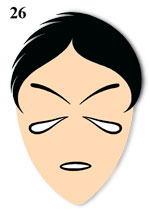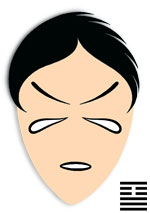

Physiognomy of symbolical emotions.
Hexagram of the canon of changes YiKing 26.


If you work as a costumier or make-up artist at dramatic theatre then can correlate characters of theatrical personages or acting persons with faces of actors and actresses according to hexagrams of the canon of changes Yi King and images of physiognomic symbols of human emotions. Namely theatrical make-up artists can mask actors and actresses according to symbolical values of emotional expressions which are characteristic for personages and acting persons of dramatic theatre, or otherwise which correspond to characters of actors and will be coordinated with psychological features and emotions of heroes in plays and performances.
-
Emotions of social relationships.
Eyebrows: individual mind predominates over public consciousness.
Eyes: personal volition subordinates to collective will.
Mouth: private needs are indifferent to requirements of society.
Public will of society influences personal volition of a man or woman, but individual
mind dominates over corporative mentality, and private needs do not
depend on social requirements.
Personal mutual relations.
Eyebrows: you realize people and-or companions agree with you.
Eyes: you do not wish to see people and-or companions do not need your presence.
Mouth: you do not want to speak and-or companions do not communicate with you.
Mental attitudes.
Eyebrows: your notion determines opinions of people.
Eyes: your point of view is caused by sights of people.
Mouth: your words are neutral to assertions of people.
People can understand you but you refuse dialogue or communication, and companions leave from you.
-
Following 27 physiognomic symbol in gallery.
About faces of actors and emotional personages of theatrical characters, also dramatic theatre
and online gallery for make-up artists.